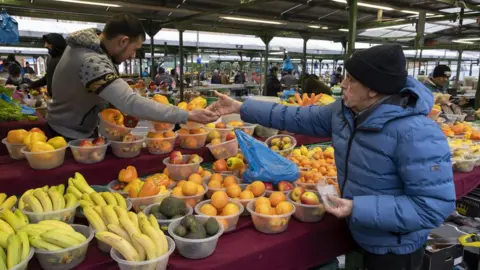Spring Statement: Key points at a glance
 Getty Images
Getty ImagesChancellor Rishi Sunak has unveiled the contents of his Spring Statement in the House of Commons
He had been under pressure to help households with the cost of living squeeze, with prices rising 6.2% in the 12 months to February - the fastest for 30 years.
The chancellor announced he would cut fuel duty, raise the threshold at which people start paying National Insurance, and pledged to cut the basic rate of income tax before the next general election.
Here is a summary of the main points.

State of the economy and public finances
 Getty Images
Getty Images- The UK economy is forecast to grow by 3.8% this year, according to the Office for Budget Responsibility, a sharp cut from its previous prediction of 6.0%
- The economy is then forecast to grow by 1.8% in 2023, 2.1% in 2024, 1.8% in 2025 and 1.7% in 2026
- The annual inflation rate was 6.2% in February, and is likely to average 7.4% for the rest of this year, but with peak of 8.7% in the final quarter of 2022
- The unemployment rate is now predicted to be lower over the next few years than in the OBR's previous forecast in October
- Debt as a percentage of GDP is expected to fall from 83.5% of GDP in 2022/23 to 79.8% in 2026/27
- The government is forecast to spend £83bn on debt interest in the next financial year, the highest on record

Fuel, energy and living costs
 Getty Images
Getty Images- Fuel duty will be cut by 5p per litre until March 2023
- Homeowners installing energy efficiency materials such as solar panels, heat pumps, or insulation will see VAT cut on these items from 5% to zero for five years
- Local authorities will get another £500m for the Household Support Fund from April, creating a £1bn fund to help vulnerable households with rising living costs
- However, the OBR on Wednesday forecast that energy bills will rise by 40% again in October, if wholesale gas prices remain at the same level they are now

Taxation
 PA Media
PA Media- The income threshold for at which point people start paying National Insurance will rise to £12,570 in July, which Mr Sunak said was tax cut for employees worth over £330 a year
- Mr Sunak pledged to cut basic rate of income tax from 20p to 19p in the pound before the end of this Parliament
- The Employment Allowance, which gives relief to smaller businesses' National Insurance payments, will increase from £4,000 to £5,000 from April

